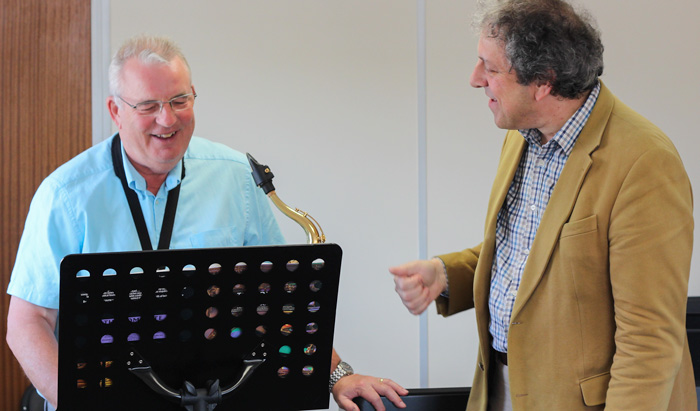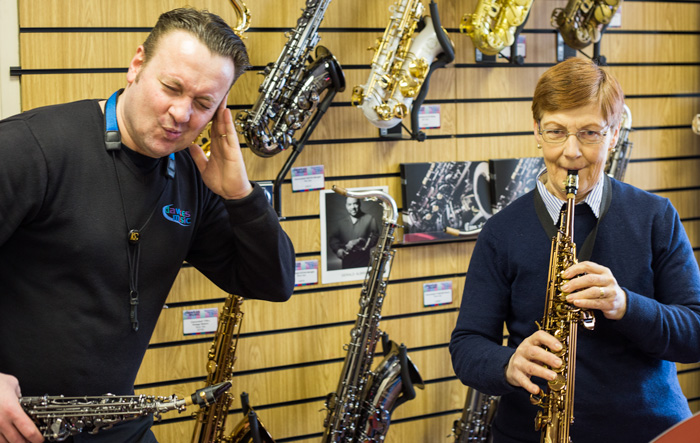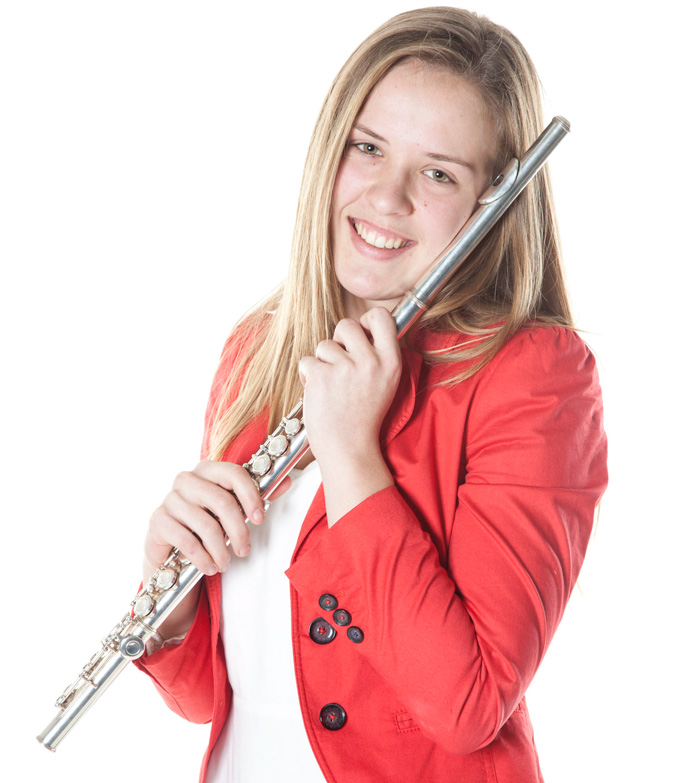Buyers Guide: New Instruments
21st January 2019Buying a new instrument (or indeed second hand!) should be an exciting prospect. Your choice should help you progress as a musician and help propel you forward. For over 50 years we’ve helped musicians at all levels choose equipment. From new beginners aged 5, 6 and 7 through to top professionals who tour the world as musicians.
With all that experience we wanted to put together our ultimate guide to testing new instruments.
RESEARCH & PLANNING
All good plans are built on solid foundations. There is a good amount of information you can gather from a range of sources about different products. But, how do you know where to start? Here are some areas you can find good advice before you even get your hands on a new instrument:
Your Teacher
- Ask your Teacher for advice. They may have particular preferences and they know how you play and what may suit best.
- If you’re a parent of a new beginner, the Teacher may want you to get certain accessories as well.
- You may also want to ask them if they have a particular brand they prefer.
- If you’re upgrading, ask them if they have any particular models or brands they recommend from their experience with other pupils.
Your Musical Peers
- Chat to fellow players in your band/orchestra, or fellow Mums & Dads if you’re buying for a new youngster. Have they had a good buying experience recently?
- If you sit next to someone who’s just upgraded, maybe ask them nicely if you can try their instrument to get a feel for it.
- Check out reviews of customers who have bought certain models or visited particular shops. Our independent Feefo reviews give you a good idea of what to expect from Dawkes.
Professional Advice
- Get professional advice from a specialist shop. Of course if it’s Woodwind & Brass we’re here to help with 50- years of experience.
- Query the shop about the different brands & price points. Ask why instruments vary in price and consider where you may be comfortable. Does that suit the players goals and current ability? Does the shop set-up the instruments before sale? Ask what happens if you have a problem with an instrument after the purchase? Any reputable specialist who knows what they’re talking about should be able to give you solid answers to these questions.
- Perhaps ask if the shop offers part-exchange against the new instrument.
- Take a look at our website for model descriptions, images and videos demonstrating the instruments.
- Consider if you can try the instruments out and compare them. Check that you can have your own testing space for your comfort. We have 9 testing spaces at Dawkes that you can book in advance. We’ll even get the stock pre-checked and reserved for you.
- Check out the different manufacturers. Has your Teacher heard of them? Can the shop tell you more about them? Are spare parts available? What will the re-sale value be like? Why does the shop choose to stock certain brands over others?
Question Yourself
- Think about why you are changing?
- Is it to help improve your tone? What would you like to change, for example darker or lighter?
- Who are some players you admire?
- What are you hoping the new instrument will bring you?
- What will it do that your old model doesn’t?
- Having done some model research, do you have a budget you’re trying to stick within?
ON THE DAY
So, you’ve done your research. You’ve got some balanced and informed advice and you’re ready to come in and try out some instruments. Don’t forget what’s most important is that you find what works best for you. Use the advice as a launching pad but don’t be afraid to go with what works on the day.
Here’s our top tips on how to test the new instruments…
What To Bring
- Your current instrument with case, mouthpiece, kit etc. It’s good to compare and you may end up wanting to trade it in against the new one.
- Some music that you know and can play comfortably. You’re there to test the instruments, not your sight reading! No instrument will play the right notes for you (sadly!).
- Someone who hears you play regularly. That may be your Teacher (if they can spare the time), a family member or friend. Someone who knows how you play can be very useful to provide an impartial but informed feedback on your sound.
- Spare time! If you’re looking to upgrade, or even buy your first instrument you don’t want to rush. Some customers decide very quickly (10-15 mins) whereas others need more time (2-3 hours).

Having a friend or teacher with you can help give another perspective.
*TOP TIP: If you’ve tried multiple instruments on multiple occasions and you still can’t decide…It’s probably not the right time to change your kit. If it takes that long, there is something else at play. New gear shouldn’t need much time to get used to or to grab you, if nothing does, stick with what you have and try again another time.
How To Test
We hear all manner of musical testing here at Dawkes. Some players like to see how high and loud they can push something, others are more conservative. Whilst there isn’t necessarily a right and wrong way, here are our tips on what we know works!
- Warm up on your old instrument first. You’re in a different environment so this gets your ears used to what your current set-up sounds like in this space. It also gets your lips & lungs warmed up and firing.
- Keep one constant. For example, if you’re testing new Trumpets, use your current mouthpiece first to try through them and get a first impression. You can always experiment with other mouthpieces further into the test.
- Play a slow, legato scale first on each new instrument you try. Alternatively, break an arpeggio into a series of long notes. Your fingers/hands are used to your instrument and they need a moment or two to adjust. It also lets you warm up this instrument and start to get a feel for the sound.
- Spend just a few minutes on each new model. Start with a legato scale or long note arpeggio, then try a couple of pieces that you can play securely. It’s best if they vary in style, so something more technical perhaps and a ballad or slow movement. It can just be an excerpt, you don’t need to do the whole Concerto, it could end up being a tiring session!
*TOP TIP: Don’t treat it as a practice session. Testing an instrument requires a different approach, and you really need to listen to your sound. Be consistent in what you’re comparing and think about how the instrument makes you feel. Does it make you want to play it more? Does it make you smile?

Our musical specialists are on hand to help and support you…honest!
- Start to eliminate models. With the tests above you should know what generally feels better or worse. If in doubt, get two models and do head-to-head and knock one out. You’ll soon be down to just 2-3 you really like.
- Ask for our advice. Our specialists are all musicians and have many years of experience helping people just like you. We’re on hand to offer advice about the brands & build quality, and we’re also happy to lend you our ears should you want them.
- Take a quick break. It’s useful to have a small break, have a drink of water and just let your chops relax. Then head back into the testing room and do the final comparisons.
- Find a great combination. It’s at this point you may want to try a couple of new mouthpiece options. Here you can refine and perfect your choice without getting confused about what bit of kit is affecting the sound. Be methodical and try back-to-back with different mouthpieces on the same instrument. You’ll soon find the winning combo!
- Don’t forget to enjoy yourself! It’s not every day you can play hundreds, or thousands of pounds worth of musical instruments. Buying a new musical instrument should be a pleasant experience, if not you’re in the wrong place!
SUMMARY
Being prepared and testing instruments methodically is a great general plan. Having some idea of why you want to move onto something else is very helpful for the people assisting you reach that goal. Try to remain open minded to suggestions about different makes or models. There are many long established musical instrument manufacturers, but there are sometimes new brands to consider.
With over 50 years experience, helping musicians at all levels, we can assure you that Dawkes Music is a great place to buy your Woodwind or Brass instruments. Our large store has 9 testing spaces and we have an award wining team on hand to help you choose the best kit for you.
If you’d like any further information or help, why not contact us and we’ll give you our best advice. Although we’ve talked a lot about in-store testing in this article, we know some customers cannot get to us. With that in mind we recommend getting advice from our specialists and then you can try an instrument on 14 day approval at home. Just get in touch if you’d like to arrange this service.
